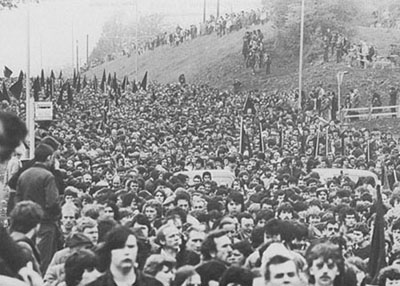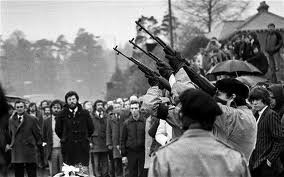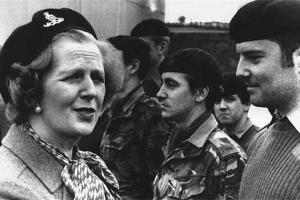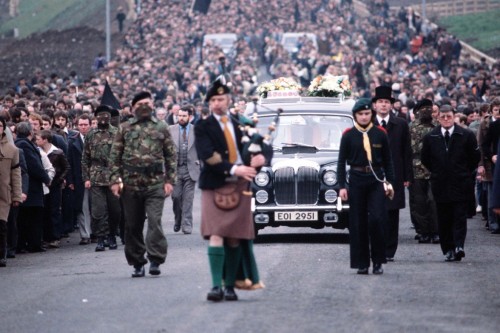The competing roles of Margaret Thatcher and Gerry Adams during the 1981 hunger strikes have produced one of the most bitterly contested disputes of the Troubles – who was most responsible for the ten deaths? Here, in a guest column, Richard O’Rawe, the former IRA public relations officer in the H Blocks during the prison protest, explains why he believes Adams not Thatcher must carry blame for most of the deaths during the historic fast:

A section of the vast crowd that attended Bobby Sands’ funeral in West Belfast in May 1981. Nine other republican prisoners followed him to early graves.
I never liked the tenor of Margaret Thatcher’s voice. It was either too raucous, or too fawning: too rehearsed for my liking. Image, presentation, a certain charisma: the MP for Finchley, I’m convinced, would have made it on the silver screen (but then all politicians are actors, aren’t they?) I was fortunate in that my experience of the 1981 IRA/INLA hunger had taught me not to be fooled by her ‘Iron Lady’ image, that The Truculent One was rather more receptive to the sweet scent of common sense than she let on.
Gerry Adams said as much in his 1996 autobiography, Before the Dawn when he wrote ‘Margaret Thatcher presented a public face as the Iron Lady who was “not for turning”, yet she was no stranger to expediency.’ Mr. Adams went on to refer to him seeing a draft of a speech that Mrs. Thatcher intended to make at imminent international conference in Ottawa, where she hoped to announce an end to the hunger strike.
For that to happen though, she had to persuade Mr. Adams and his committee of political colleagues and advisers to accept a set of proposals that she had sent them on 4 July 1981 and which they had rejected. At that point there had been four deaths in the blocks but Mr. Adams and Co. spurned the British prime minister’s offer, the hunger strike continued, and accordingly another six hunger strikers lost their lives.
It is now eight years since my book Blanketmen and three years since my second book, Afterlives were published. For seven of those eight years I have had the fight of my life with Gerry Adams and his acolytes. Throughout I have stood by the assertion that the British government had made a substantial offer on 4 July 1981, which was rejected by the committee – against the wishes of the prison leadership, of which I was a part.

Richard O’Rawe was ‘in fight of his life’ with Gerry Adams over the truth of what happened during the protest
Furthermore, I said that the committee did not make the hunger strikers aware of the particulars of the Brit offer. On both accounts the hard evidence has shown that I was telling the truth. My vindication has come via a tortuous process of British government Freedom of Information requests, the release of thirty-year British government documents, the verbal and written testimony of the intermediary, Brendan Duddy, and the numerous contradictions and evasions from those who tried, unsuccessfully, to cover for the committee.
All that remains to be settled is the motivation for the committee’s behaviour. Was it out of its depth in its attempts to outsmart the British? Or was it so intoxicated with the prospect of impending electoral success (in the impending by-election for first hunger striker, Bobby Sands’ seat) that they took a decision to ignore the offer and thence allow for hunger strikers to die?
When I sat down to quietly collect my thoughts before I began writing this article, I asked myself a series of questions: what do I want to say about Margaret Thatcher? That I despised the woman? Of course I did. She was no friend of the Irish – much less Irish republicans. She had it in her power to go the clichéd ‘extra mile’, but didn’t. But then: would the extra mile have mattered to Adams and Co.?
Margaret Thatcher is dead. There’ll be no crocodile tears or sugar-coated words from me about the life and times of the Iron Lady. She was our avowed enemy and we expected no quarter from her. Still, we can’t blow back the tide of history and we can’t resurrect our brave, brave hunger strikers. We can, however, treat our own with respect. We can be honest. Our hunger strikers deserve that. If that means Big Gerry and his committee accepting culpability for the deaths of the last six hunger strikers, then so be it.




I had considered myself quite ‘au fait’ with things in the North but to my amazement I’ve never even heard of Richard O’Rawe’s books. Having left Killing Rage on the plane to Australia recently I am desperate to source another copy … any suggestions folks?
I have heard of Richard and his story’s are very reliable
Reblogged this on seachranaidhe1.
If you are ‘au fait’ with the North then I’m really surprized that you have not heard of Richard O’Rawe’s books, but they deal mostly with the Hunger Strike. To get a replacement copy of “Killing Rage” I would suggest this website : http://www.abebooks.com. I little known fact about Mrs Thatcher was that when she was , Minister of Education, in the mid-1970s her first duty was to abolish free milk given to school children which earned her the name “Mrs Thatcher milk snatcher”.
Several years ago I purchased, in a car boot sale in Castlebar, Co Mayo and for the princely sum of 50 cent, a small candle figurine of Mrs Thatcher which I will be happily burning this weekend when I see my kids.
The less time spent on that women the better it will be.
Malachy from Galway
While she was indeed responsible for discontinuing the free milk program for children over the age of seven in schools, it’s worth noting that this decision was made in the midst of significant economic constraints and a push towards cost-cutting in various sectors. And let’s not forget, it was Harold Wilson’s Labour government that initially removed the free milk for secondary schools in 1968.
The tidbit about your candle figurine is both entertaining and slightly macabre. Celebrating any figure, controversial or not, with such an act seems like a unique choice. One wonders what message that might be sending to your kids. Perhaps a lesson on constructive dialogue and understanding might be more valuable? But to each their own.
And finally, “the less time spent on that woman the better it will be.” Oh, Malachy, if only you followed your own advice! It’s always curious when someone who ostensibly wants to avoid discussing a topic ends up being one of its most fervent commentators. It’s almost as if there’s a slight contradiction.
I always thought it suited Adams to let our brave comrades die for his own personal benefit, at the time the people knew nothing about Provisional Sinn Fein and selling out, it suited Adams because he knew all along where he wanted to take himself and the vast majority of the provisional movement, now look at what Adams has done and Mcguiness and a lot of other EX-republicans who are now under the lash of the british and you can see for yourselves the deceit that was in Adams mind maybe not so much at that time of the hunger strikers but certainly afterwards, EX P.O.W, Erin Go Bragh
Richard O Rawe is the authoritative and definitive voice of the H-Blocks. In both of his books he exposed the hypocrisy of Adam’s cabal and their conscious and calculated decision to let six IRA and INLA hunger strikers die to advance a hidden political agenda based on personal policital ambition. Their reward? Membership of a Unionist coalition in a resurrected Stormont which the IRA brought down in March 1972. They have made the six county state more secure than at any time since 1921.
Regarding Adams and his many hard decisions throughout The Troubles-the quote that comes to mind is “Heavy is the head that wears the crown.” It seems to be simplistic to expect that any decision made by the 1981 Hunger Strike committee can be judged as simply right or wrong. And if such a decision was made(and given the intractability of Thatcher, it seems unlikely), there is a precedent. The 1946 hunger strikers were let to die by Eamon de Valera who said that “letting the men die was the lesser of two evils as they threatened the whole community.” They were cast as pariahs. Bobby Sands and his comrades are enshrined forever in the minds and hearts of many and the political gains from their ultimate sacrifice have been immeasurable.
If Rawe’s correct the IRA seems to have suffered from the same institutional malaise as many a large organisation. For the big fellas at the top of the food chain it’s the rank and file that emerge as the real enemy. I’m certain most trade union leaders fear militant activists far more than Government or corporate management. Most political party’s enjoy a similar dynamic with their membership. Bureaucratic and institutional stability comes at a price, the inevitable betrayal of the rank and file.
I always believed ye Richard!…will Gerry take the lie detector test that was offered???
Pingback: UN EX HUNGER STRIKER ‘RICORDA’ LA THATCHER | The Five Demands
Gerry don`t do lie detectors. They can`t make em strong enough yet.
Pingback: Is the proof of Margaret Thatcher’s Northern Ireland policy the success of modern Sinn Fein? « Slugger O'Toole
Pingback: « C’est Adams, non Thatcher, qui est responsable de la mort des six derniers grévistes de la faim | «Liberation Irlande
Pingback: Adams, Thatcher And Blanket Denials | Broadsheet.ie
Pingback: THATCHER STREET OR BOBBY SANDS STREET ? PARIS POLITICIANS DIVIDED ! | seachranaidhe1
May the name Thatcher never be brought in to any conversation or mentioned in public. When you say the word it can cause so much upset . And for someone that is dead no name should have that affect on any humane being . You just need to see the devastation that Bastard has left in Scotland Ireland Wales . The only good thing this Bastard has done for us all she died . And may the Devil eat her sideways . By the way I missed out devastation in England they deserve all they got Shower of shite from top to bottom
Firstly, it’s always delightful to see someone arguing for censorship, especially of historical figures, based on personal feelings. I mean, why remember history, warts and all, when we can just pretend things never happened, right?
Regarding your claims about devastation, perhaps a brief history lesson is in order. Margaret Thatcher was a polarising figure, undoubtedly, but her leadership also led to significant economic reforms. The UK was suffering from stagnation, labour strikes, and a decline in global influence. Her policies, like them or not, modernised the British economy and made it more competitive on the global stage.
Yes, the mining communities suffered. Change is often painful. But it’s worth noting that the world was shifting away from coal. Are we just going to ignore global market dynamics and the evolution of energy markets? Should the UK have sustained a dying industry indefinitely?
Regarding Ireland, Thatcher’s relationship with her was complex, especially during the Troubles. But again, let’s not forget that she signed the Anglo-Irish Agreement in 1985, which was a crucial step toward peace in Northern Ireland.
You lament the ‘devastation’ in England. You might want to remember that her policies also led to growth in various sectors and reduced the power of unions that had held the nation to ransom multiple times. But sure, let’s cherry-pick history.
Lastly, celebrating the death of anyone, regardless of personal opinions, is a rather grim sentiment. It’s one thing to critique someone’s policies or leadership, it’s another to dance on their grave.
And just for clarity, I’m not saying Thatcher was perfect. No leader is. But let’s at least attempt to have a reasoned conversation about her legacy instead of resorting to name-calling and misrepresentations. But then again, maybe that’s a bit too much to ask for.
It breaks my heart to think of the death of Joe McDonnell and being so close to one of his family members learned the truth of what happened to him from my friend. Gerry Adams sat and ate carry out food at the bedside of Joe as he starved, she told me and that the initial agreement was that only Bobby Sands was to die but that did not happen. Eventually when the negotiation with Thatcher had been finalised Joe was still left to die.